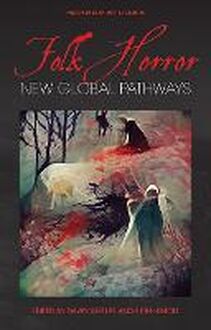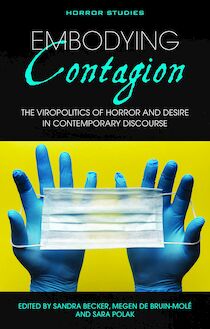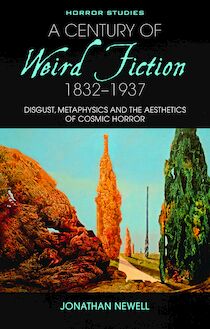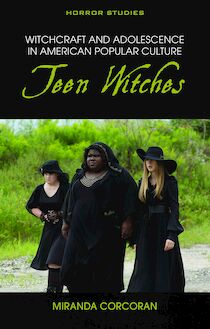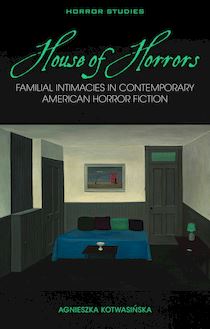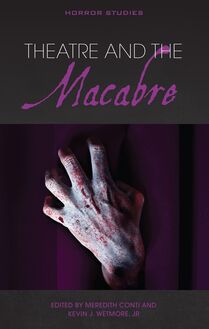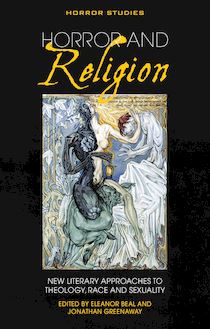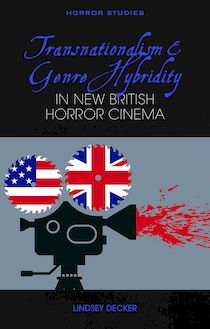New Blood , livre ebook
164
pages
English
Ebooks
2021
Vous pourrez modifier la taille du texte de cet ouvrage
Obtenez un accès à la bibliothèque pour le consulter en ligne En savoir plus
Découvre YouScribe en t'inscrivant gratuitement
Découvre YouScribe en t'inscrivant gratuitement
164
pages
English
Ebooks
2021
Vous pourrez modifier la taille du texte de cet ouvrage
Obtenez un accès à la bibliothèque pour le consulter en ligne En savoir plus
Publié par
Date de parution
15 janvier 2021
Nombre de lectures
1
EAN13
9781786836366
Langue
English
Poids de l'ouvrage
1 Mo
The taste for horror is arguably as great today as it has ever been. Since the turn of the millennium, the horror genre has seen various developments emerging out of a range of contexts, from new industry paradigms and distribution practices to the advancement of subgenres that reflect new and evolving fears. New Blood builds upon preceding horror scholarship to offer a series of critical perspectives on the genre since the year 2000, presenting a collection of case studies on topics as diverse as the emergence of new critical categories (such as the contentiously named ‘prestige horror’), new subgenres (including ‘digital folk horror’ and ‘desktop horror’) and horror on-demand (‘Netflix horror’), and including analyses of key films such as The Witch and Raw and TV shows like Stranger Things and Channel Zero. Never losing sight of the horror genre’s ongoing political economy, New Blood is an exciting contribution to film and horror scholarship that will prove to be an essential addition to the shelves of researchers, students and fans alike.
Acknowledgements
Figures and Tables
Notes on Contributors
Horror 2020: Introducing New Blood - Eddie Falvey, Joe Hickinbottom, Jonathan Wroot
Part One: Framing Horror
1. Apprehension Engines: The New Independent ‘Prestige Horror’ - David Church
2. Hardcore Horror: Challenging the Discourses of ‘Extremity’ - Steve Jones
3. From Midnight Movies to Mainstream Excess: Cult Horror Festivals and the Academy - Xavier Mendik
Part Two: Horror Reception
4. A Master of Horror? The Making and Marketing of Takashi Miike’s Horror Reputation - Joe Hickinbottom
5. Bloody Muscles on VHS: When Asia Extreme Met the Video Nasties - Jonathan Wroot
6. Streaming Netflix Original Horror: Black Mirror,
Stranger Things and Datafied TV Horror - Matt Hills
Part Three: Emerging Subgenres
7. The digital gothic and the Mainstream Horror Genre: Uncanny Vernacular Creativity and Adaptation - Jessica Balanzategui
8. Nazi Horror, Reanimated: Rethinking Subgenres and Cycles - Abigail Whittall
9. Digital Witness: Found Footage and Desktop Horror as Post-cinematic Experience - Lindsay Hallam
Part Four: Horror in the World
10. Revisiting the Female Monster: Sex and Monstrosity in Contemporary Body Horror - Eddie Falvey
11. The Kids are Alt-right: Hardcore Punk, Subcultural Violence and Contemporary American Politics in Jeremy Saulnier’s Green Room - Thomas Joseph Watson
12. Twenty-first-century Euro-snuff: A Serbian Film for the Family - Neil Jackson
Bibliography
Index
Publié par
Date de parution
15 janvier 2021
Nombre de lectures
1
EAN13
9781786836366
Langue
English
Poids de l'ouvrage
1 Mo
HORROR STUDIES
Series Editor Xavier Aldana Reyes, Manchester Metropolitan University
Editorial Board Stacey Abbott, Roehampton University Linnie Blake, Manchester Metropolitan University Harry M. Benshoff, University of North Texas Fred Botting, Kingston University Steven Bruhm, Western University Steffen Hantke, Sogang University Joan Hawkins, Indiana University Agnieszka Soltysik Monnet, University of Lausanne Bernice M. Murphy, Trinity College Dublin Johnny Walker, Northumbria University
Preface
Horror Studies is the first book series exclusively dedicated to the study of the genre in its various manifestations - from fiction to cinema and television, magazines to comics, and extending to other forms of narrative texts such as video games and music. Horror Studies aims to raise the profile of Horror and to further its academic institutionalisation by providing a pubishing home for cutting-edge research. As an exciting new venture within the established Cultural Studies and Literary Criticism programme, Horror Studies will expand the field in innovative and student-friendly ways.
The Contributors, 2020
All rights reserved. No part of this book may be reproduced in any material form (including photocopying or storing it in any medium by electronic means and whether or not transiently or incidentally to some other use of this publication) without the written permission of the copyright owner except in accordance with the provisions of the Copyright, Designs and Patents Act. Applications for the copyright owner s written permission to reproduce any part of this publication should be addressed to the University of Wales Press, University Registry, King Edward VII Avenue, Cardiff, CF10 3NS.
www.uwp.co.uk
British Library Cataloguing-in-Publication Data
A catalogue record for this book is available from the British Library.
ISBN: 978-1-78683-634-2 eISBN: 978-1-78683-636-6
The rights of The Contributors to be identified as authors of this work have been asserted in accordance with sections 77 and 79 of the Copyright, Designs and Patents Act 1988.
Cover image EyeEm / Alamy Stock Photo
The publisher has no responsibility for the persistence or accuracy of URLs for any external or third-party internet websites referred to in this book, and does not guarantee that any content on such websites is, or will remain, accurate or appropriate.
Contents
Acknowledgements
Figures and Tables
Notes on Contributors
Horror 2020: Introducing New Blood Eddie Falvey, Joe Hickinbottom, Jonathan Wroot
Part One: Framing Horror
1. Apprehension Engines: The New Independent Prestige Horror David Church
2. Hardcore Horror: Challenging the Discourses of Extremity Steve Jones
3. From Midnight Movies to Mainstream Excess: Cult Horror Festivals and the Academy Xavier Mendik
Part Two: Horror Reception
4. A Master of Horror? The Making and Marketing of Takashi Miike s Horror Reputation Joe Hickinbottom
5. Bloody Muscles on VHS: When Asia Extreme Met the Video Nasties Jonathan Wroot
6. Streaming Netflix Original Horror: Black Mirror , Stranger Things and Datafied TV Horror Matt Hills
Part Three: Emerging Subgenres
7. The digital gothic and the Mainstream Horror Genre: Uncanny Vernacular Creativity and Adaptation Jessica Balanzategui
8. Nazi Horror, Reanimated: Rethinking Subgenres and Cycles Abigail Whittall
9. Digital Witness: Found Footage and Desktop Horror as Post-cinematic Experience Lindsay Hallam
Part Four: Horror in the World
10. Revisiting the Female Monster: Sex and Monstrosity in Contemporary Body Horror Eddie Falvey
11. The Kids are Alt-right: Hardcore Punk, Subcultural Violence and Contemporary American Politics in Jeremy Saulnier s Green Room Thomas Joseph Watson
12. Twenty-first-century Euro-snuff: A Serbian Film for the Family Neil Jackson
Bibliography
Notes
Acknowledgements
The editors wish to thank the series editor, Xavier Aldana Reyes, for his enthusiasm and support for this book. They also wish to thank Sarah Lewis and her colleagues at the University of Wales Press for their support, advice and professionalism.
Eddie Falvey thanks his co-editors, Joe and Jon, for their help along the way. He wishes to dedicate his part in this volume to his father, Martin, who would watch all of these films, and to his mother, Jane, who would watch none of them.
Joe Hickinbottom thanks his fellow editors, Eddie and Jon, for working with him on this project, and offers his gratitude to Eddie for his unwavering support while writing his chapter. His contribution to this volume is dedicated to four people who, collectively, have inspired him and listened to him talk about Takashi Miike for more years than any of them would like to be reminded of: Rhiannon, Mum and Dad, and Song.
Jonathan Wroot wishes to thank Eddie and Joe for allowing him to assist in the publication of this volume. He also offers his thanks to the Cult Film Research Group at King s College London for some very useful feedback on his chapter.
Figures and Tables
Figures
Figure 1.1 . Mark Korven s Apprehension Engine . Photograph, Kai Korven.
Figure 3.1 . The image from the Nouveaux-Pictures Cine-Excess DVD release of Suspiria reproduced in this volume is courtesy of its present distributor CultFilms.co.uk. We wish to thank the company for providing the permission to reproduce the image in this volume.
Figure 3.2 . Roger Corman receives his Cine-Excess Lifetime Achievement Award from actress Jane Asher at the festival in 2008.
Figure 3.3 . Cult performer Franco Nero receives his Cine-Excess Lifetime Achievement Award at the festival in 2011.
Figure 3.4 . Author Victoria Price receives a posthumous Cine-Excess Lifetime Achievement Award for her father, actor Vincent Price, in 2018.
Figure 5.1 . Graham Humphreys s artwork for Bloody Muscle Body Builder in Hell Stand Entertainment.
Tables
Table 9.1 . A table of feature-length post-cinematic horror films.
Notes on Contributors
Jessica Balanzategui is Lecturer in Cinema and Screen Studies at Swinburne University of Technology. Jessica s research examines childhood, history and national identity in global film and television; the impact of technological and industrial change on cinema and entertainment cultures; and vernacular storytelling and aesthetics in digital cultures (particularly the digital gothic). Her book, The Uncanny Child in Transnational Cinema: Ghosts of Futurity at the Turn of the Twenty-first Century , was published in 2018 by Amsterdam University Press, and her work has been published in numerous edited collections and refereed journals.
David Church is a Postdoctoral Fellow in Gender Studies at Indiana University. His specialisms include genre studies, taste cultures, gender/sexuality studies and histories of film exhibition and distribution. He is the author of Disposable Passions: Vintage Pornography and the Material Legacies of Adult Cinema (2016), Grindhouse Nostalgia: Memory, Home Video, and Exploitation Film Fandom (2015) and a forthcoming monograph on the Mortal Kombat video game franchise. He is currently at work on a book titled Post-Horror: Art, Genre, and Cultural Elevation (forthcoming, Edinburgh University Press).
Eddie Falvey completed his AHRC-funded PhD project on the early films of New York at the University of Exeter, where he taught in the Department of English. Since finishing his PhD, Eddie has been Lecturer in the School of Arts and Media at Plymouth College of Art. He is the author of an upcoming monograph on Re-Animator (2021) and is in the process of developing his thesis into a monograph for Amsterdam University Press.
Lindsay Hallam is Senior Lecturer in Film at the University of East London. She is the author of Screening the Marquis de Sade: Pleasure, Pain and the Transgressive Body in Film (2012) and Twin Peaks: Fire Walk with Me (2018). She has contributed to various collections, including Trauma, Media, Art: New Perspectives (M. Broderick and A. Traverso (eds), 2010), Dracula s Daughters: The Female Vampire on Film (D. Brode and L. Deyneka (eds), 2013) and Transnational Horror Across Visual Media: Fragmented Bodies (D. Och and K. Strayer (eds), 2014).
Joe Hickinbottom completed his AHRC-funded PhD project on the reception of Takashi Miike at the University of Exeter, where he also taught in the Department of English. His PhD thesis, Takashi Miike and the Dynamics of Cult Authorship (2017), offers an extensive critical history of the reception of Miike and his cinema, which demonstrates the discursive currency of his established status as a cult auteur. Joe s research interests include questions of authorship, cult cinema, genre studies and Japanese cinema.
Matt Hills is Professor of Media and Film at the University of Hudders-field. He is the author of six monographs, including Fan Cultures (2002) and The Pleasures of Horror (2005), as well as being the editor of New Dimensions of Doctor Who (2013) and co-editor of Transatlantic Television Drama (2019). Matt has published more than a hundred book chapters/ journal articles on fandom and cult media, including chapters in Horror Zone: The Cultural Experience of Contemporary Horror Cinema (I. Conrich (ed.), 2009) and Wiley-Blackwell s A Companion to the Horror Film (H. M. Benshoff (ed.), 2014).
Neil Jackson is Senior Lecturer in Film Studies at the University of Lincoln. Neil is the co-editor of Snuff: Real Death and Screen Media (2016). He recently contributed chapters on Exhausted: John C Holmes the Real Story (1981) to Grindhouse: Cultural Exchange on 42nd Street and Beyond (A. Fisher and J. Walker (eds), 2016) and Forced Entry (1972) to the Porn Studies journal. He is currently preparing a study of the representation of the Vietnam War in exploitation cinema for Bloomsbury.
Steve Jones is Senior Lecturer and Head of Media in the Department of Social Sciences at Northumbria University, as well as Adjunct Research Professor in Law and L
